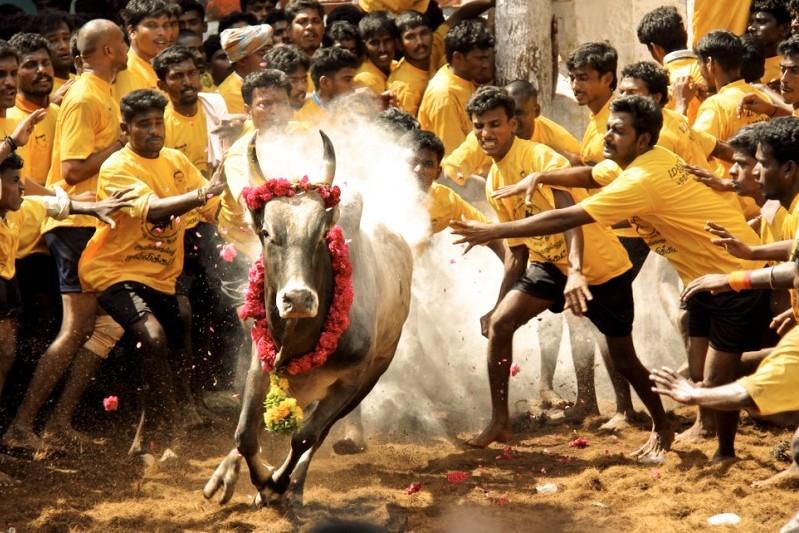Jallikattu is the deformed, burnt end of a tradition that started differently. The ancient Pongal festival that is celebrated for four days expresses gratitude towards harvest and abundance. On the third day of the festival, people ‘Thazhuvuthal’ (or Anaippu) the ‘Eru’ (or Pul). They hug the bull. Somewhere down the centuries, the hugging metamorphosed to dominion. The bull is bulled over so that no one bullies the one who tries to bull the bull.


The society is divided over banning the practice of Jallikattu and those who promote the same. The recent ordinance that has been passed to permit continuance of Jallikattu is a constitutional failure in protecting animals, animal lovers and encouraging a negative culture to thrive. Those who want the practice banned, wish so, on the grounds of eliminating cruelty towards animals and discouraging a damaging practice to thrive. Those who promote Jallikattu are clinging to the nostalgia of an archaic tradition with a smattering of economic reason that people in Tamil Nadu are incentivized to breed an exclusive species of Bos Indicus. The Kangayam breed of bulls used for Jallikattu is endangered species and exclusively bred to be tortured on Jallikattu. Ironic, is it not? As per the Jallikattu Regulation Act – 2009, the Animal Husbandry Department is responsible to ensure that the bulls are not drugged or chemically harmed before Jallikattu and while it is in process. However, that rule is flouted with such impunity as though it is non-existent and irrelevant.
Back in the days of the British Raj, the Indian royalty and the colonizers considered hunting animals as recreation. Typically, the horse-borne hunters would have their guns pointed at a clearing in the forest where the servants would bully the animal, to be shot at. The spirit behind such a cruel sport was to reinforce human species’ superiority by rendering the other, powerless. Jallikattu does the same. It always has been doing that.
As a state, Tamil Nadu is steeped in richness of culture, language, art and it has contributed to the intellectual advancement of the country. Tamil is an ancient Dravidian language that is as high in esteem and old in genesis as Devnagari and Sanskrit. Over 70 million people speak the language (which in the process of evolution has remained the most original, as compared to other languages). The literary tradition of the state dates back to more than 2000 years. A state that is so illustrious in its lineage and continues leading the country by being one of the states with high literacy; a tradition such as Jallikattu is unacceptable, to say the least.
The civilization has arrived at a digital age where hierarchies, race, gender, sex, economy has undergone complete change. If one has to preserve the ancient, then it should be for the purpose of enriching cultural exchange and making sublime the very existence of the people to whom the lineage belongs. No culture, leave alone Tamil Nadu, should identify with such inhuman, disrespectful, cruel practice of Jallikattu and associate with promotion of shallow and vulgar display of machismo and patriarchy.
Discuss this article on Facebook




